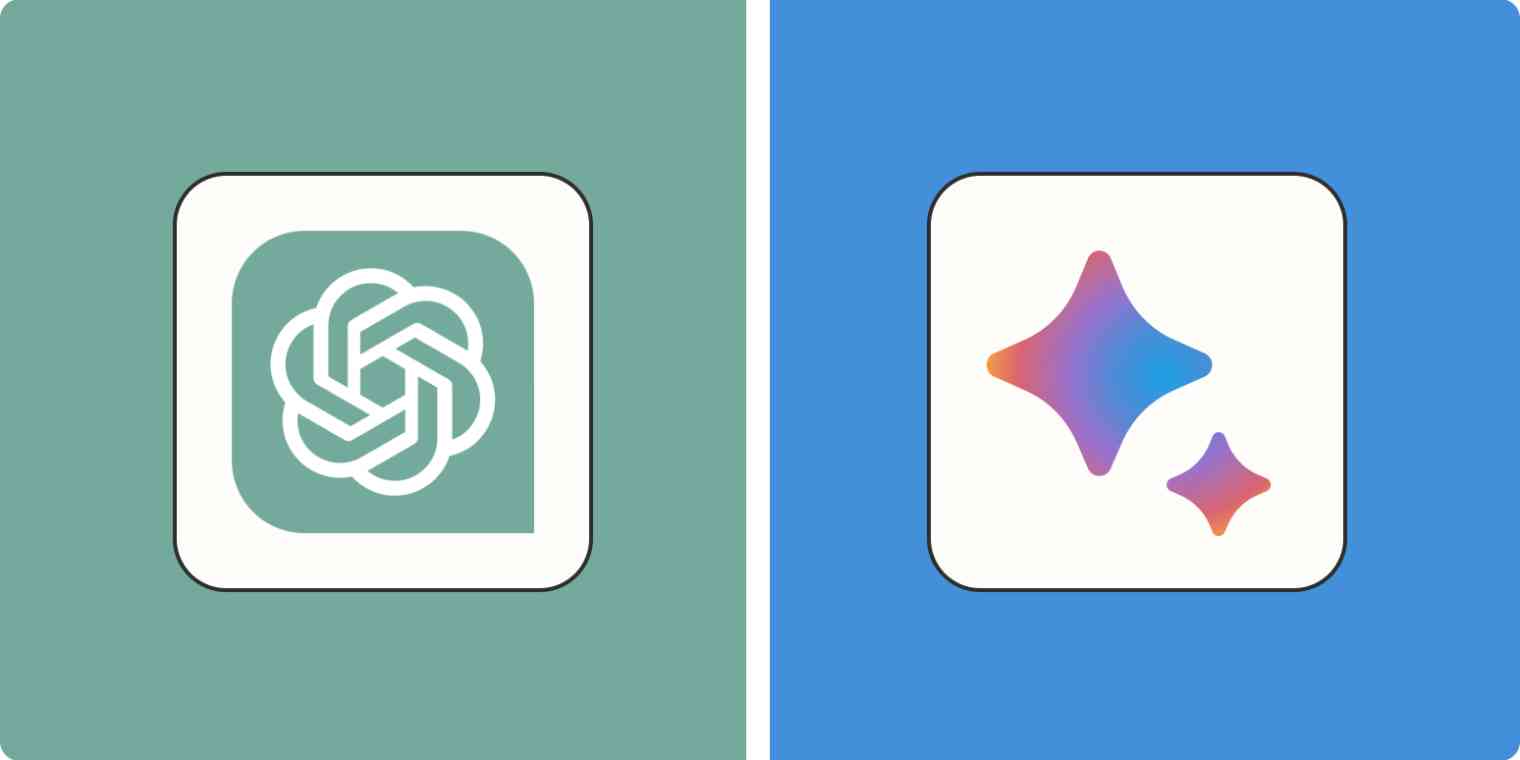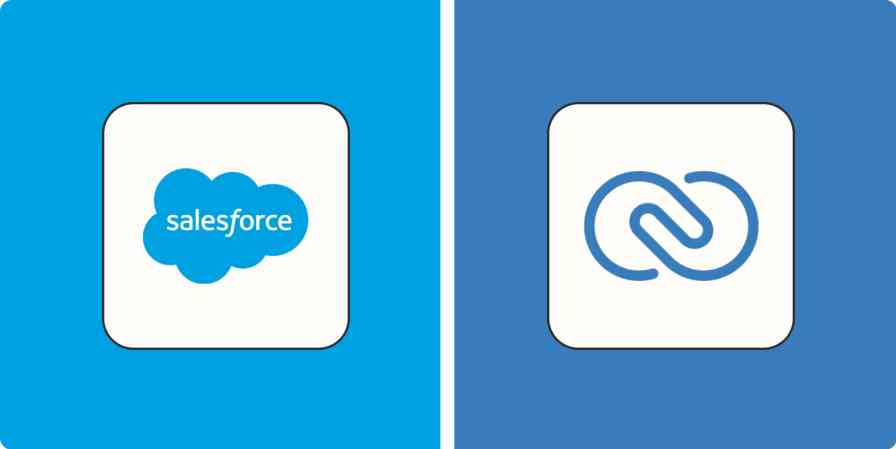Up until recently, ChatGPT limited advanced features such as web browsing and data analysis to paid subscribers, while Gemini (formerly Google Bard) performed the same functions faster and for free—this was the most striking difference between the two AI chatbots.
With OpenAI's release of GPT-4o—their new multimodal AI model that's available to all users—that argument's out the window. But there are plenty of other features that set the two apps apart.
Here are the main differences I discovered while comparing Gemini vs. ChatGPT.
Both apps can analyze and generate AI images, but Gemini does it for free
Both apps can process data-related tasks, but ChatGPT does more for free
Gemini vs. ChatGPT at a glance
The gap between what separates Gemini from ChatGPT is narrowing, but they still differ in a few important ways. Here's a quick breakdown of how they compare, but read on for more details.
| ChatGPT | Gemini |
|---|---|---|
Creators | OpenAI | |
Models | GPT-4o (all users); GPT-4 (paid tiers only) | Gemini Pro; Gemini 1.5 Pro (Gemini Advanced only) |
Context window | 128,000 tokens | Up to 1 million tokens |
Supported languages | Over 50 | Over 40 |
Platforms | Web, mobile, and desktop | Web and mobile |
Pricing | Free; ChatGPT Plus is available for $20/month | Free; Gemini Advanced is available for $19.99/month (first 2 months free) |
Gemini is built for research
Gemini is one very chatty assistant, zealous in its approach to gathering research for you to make your life easier. Does it cite its sources as it goes? No. But it will if you tell it to.
You can also click Double-check response (the Google icon) under any response to learn more or fact-check Gemini's response. (Text highlighted in green indicates links to Google Search results with similar information; text highlighted in orange indicates results with differing information.) It'll even offer related search queries on a given topic, which can be helpful when you're doing any level of research.
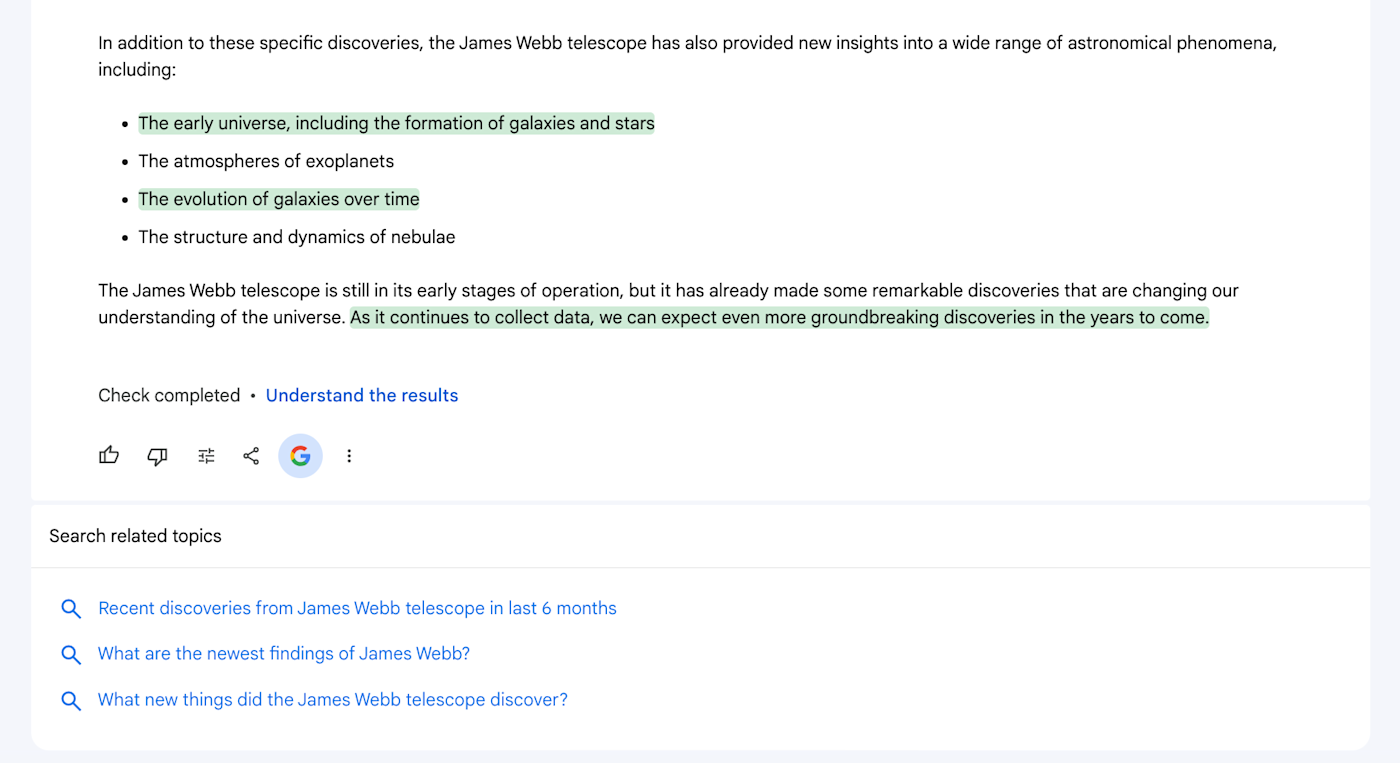
ChatGPT can also crawl the web and cite its sources. Sometimes, it'll automatically do this; other times, you have to prompt it. In my experience, however, ChatGPT has been more likely to provide fake sources (also known as hallucinations).
ChatGPT offers a more reliable and advanced voice mode
Both AI chatbots allow you to verbally interact with them. In Gemini, this feature operates more like voice-to-text: you speak (and manually click send), Gemini transcribes it, it responds with text, and you click play to listen to Gemini's responses.
ChatGPT, however, lets you verbally communicate back and forth with it. There are also manual controls to pause, resume, and exit the conversation. If you're using the multimodal GPT-4o, ChatGPT responds in an average of 0.32 seconds, giving the impression of having a real conversation. The voices are also a lot more natural sounding, and you can choose from a handful of different ones.
OpenAI is also rolling out Real-Time Voice Mode (powered by GPT-4o) to ChatGPT Plus users. This will let you interrupt ChatGPT without clicking, and you'll be able to share a live feed of something and chat about it. For some terrifying examples of what this looks like, check out OpenAI's demo.
Google, for its part, recently shared a demo of Google Astra, which boasts similar functionalities to Real-Time Voice Mode, but they haven't announced plans to roll it out anytime soon.
Gemini analyzes and creates images for free—and also shows images from the web
When it comes to images, Gemini and ChatGPT have made leaps and bounds since their early days. Here's how their image-related features stack up.
Gemini can retrieve images from the web
Gemini can surface relevant images from Google Search, which is a key feature that sets it apart from ChatGPT. Whether you're researching specific dog breeds, images from the James Webb telescope, or bicycle repairs, Gemini can churn out specific images from other web pages for visual context. You can also click on an image, and Gemini will open the web page with the image source in a new browser tab.
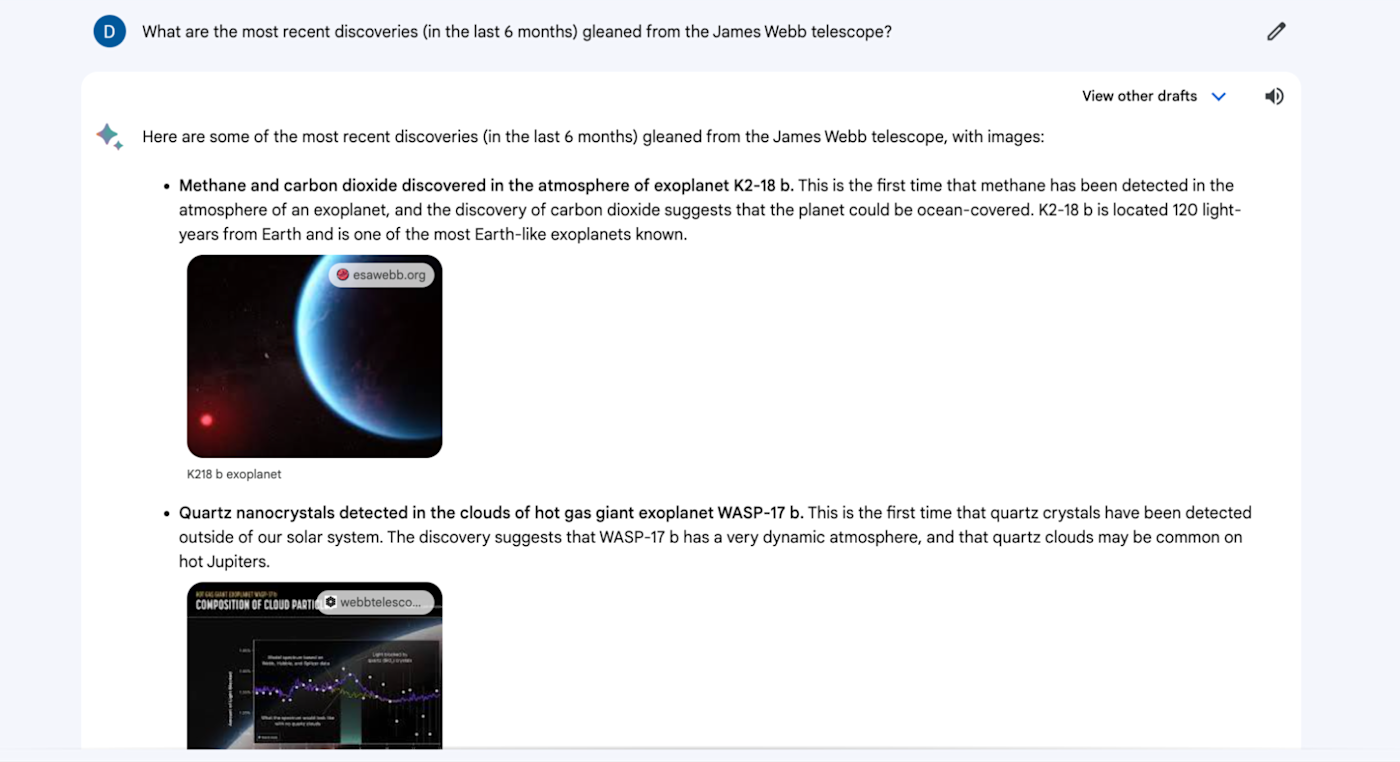
ChatGPT, on the other hand, can't retrieve images from the web. But it'll share links to relevant images if you prompt it to. I've also noticed that ChatGPT now tries to render images directly in the chat, which usually results in a broken image file (as shown below). But I wouldn't be surprised if it could pull in images in the near future.
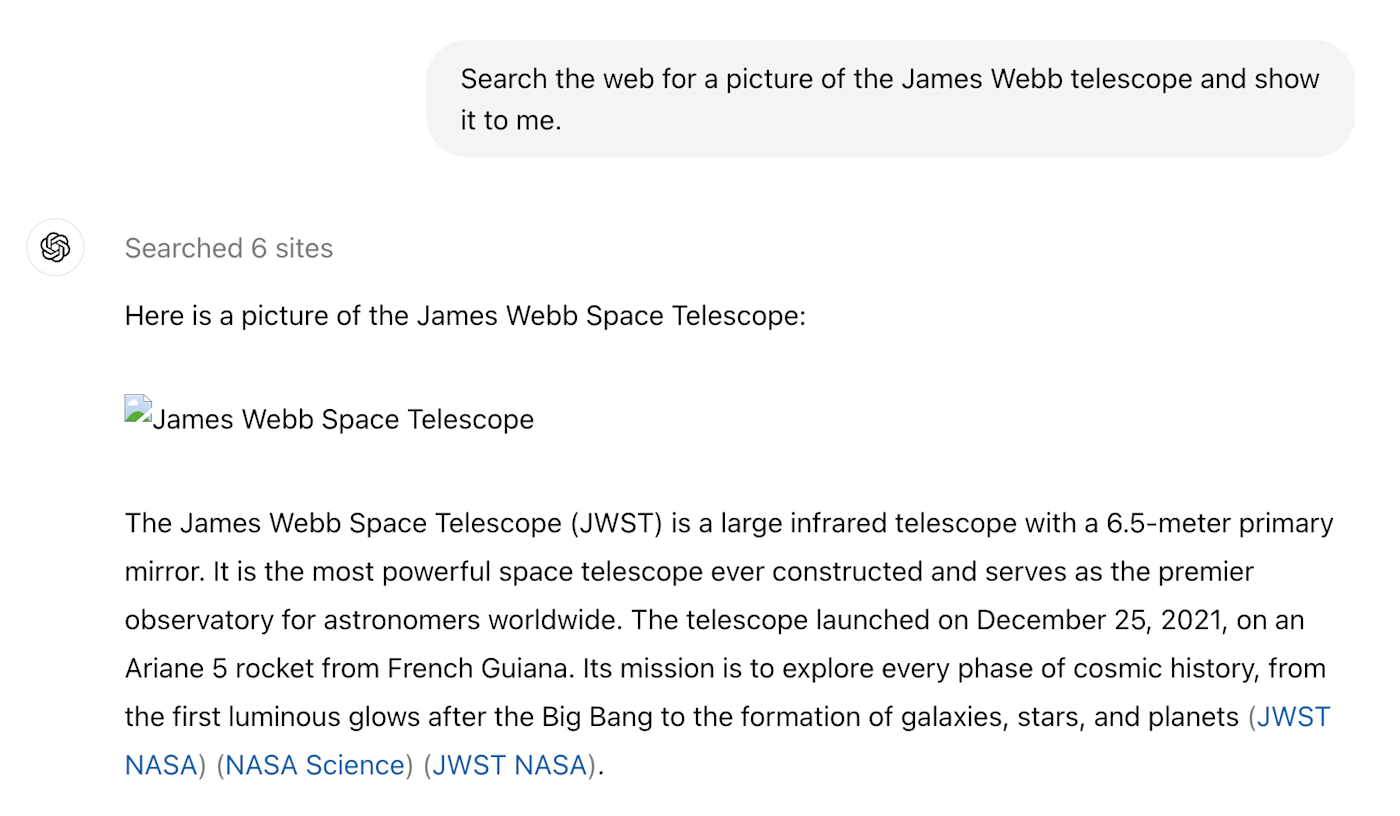
Both apps can create images, but Gemini does it for free
Gemini and ChatGPT can generate AI images, but the key difference is that Gemini lets you do it for free, whereas ChatGPT limits this feature to only paid subscribers with DALL·E 3.
This means you can use either AI chatbot to do things like generate blog images and create business logos. Or you can use them for what they were clearly intended to do: create museum-worthy images of a fluffy dog painting a vast array of galaxies.
Here's what that fluffy dog painter looks like according to ChatGPT:
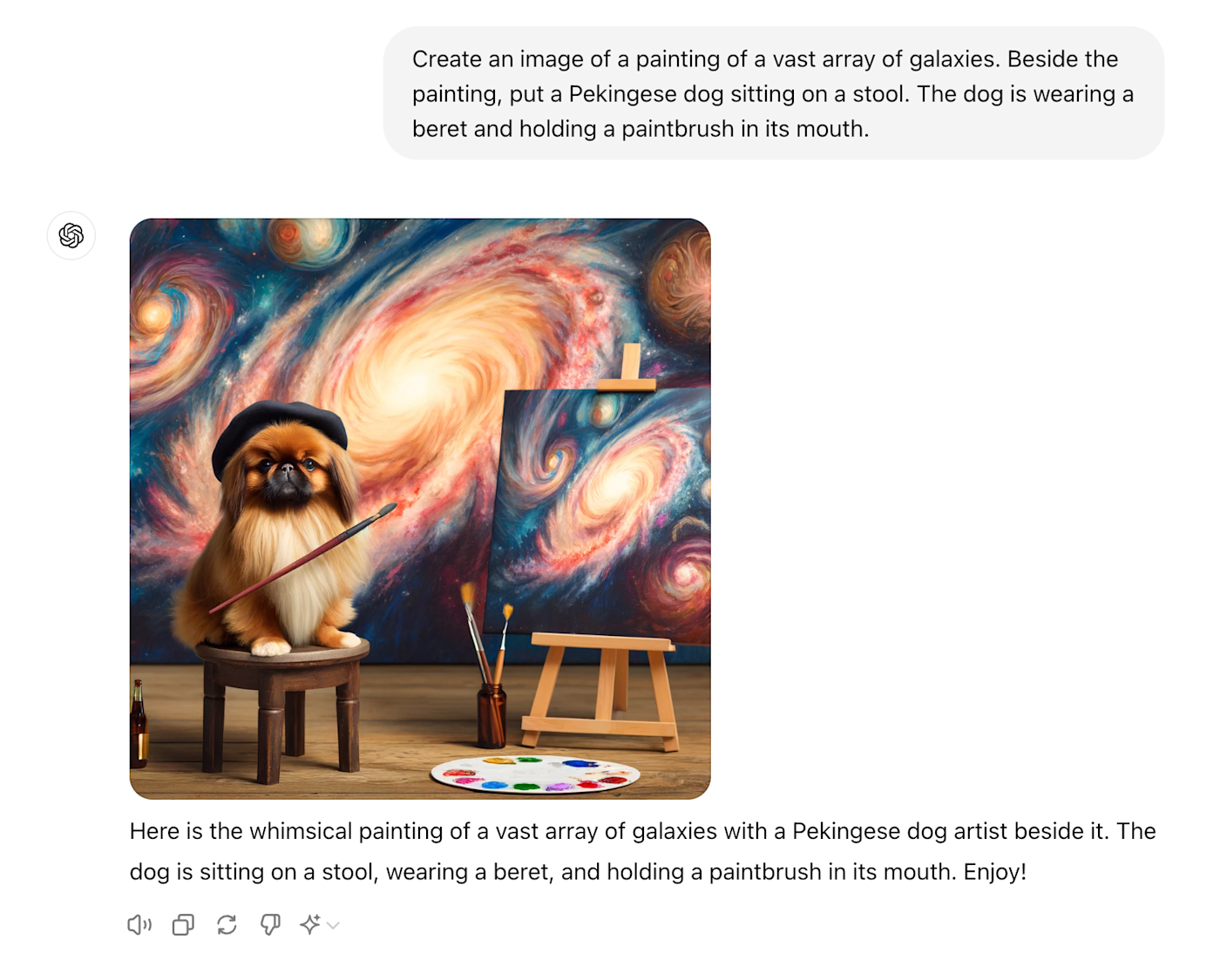
And here's the four-legged painter according to Gemini:
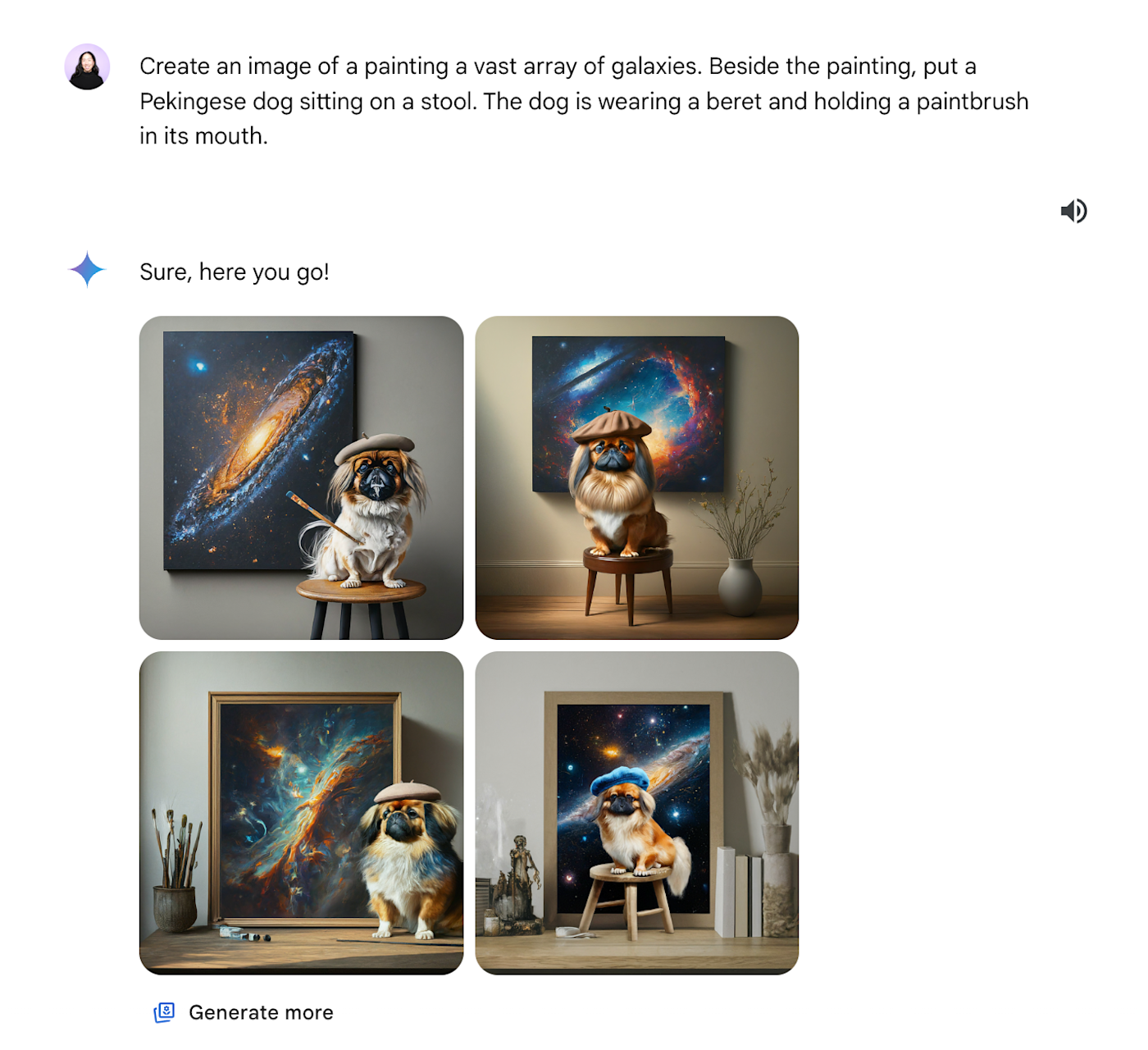
ChatGPT also recently kicked their AI image generation capabilities up a notch: you can now highlight specific areas of the image that you want to tweak and prompt ChatGPT to edit only those areas. If you're serious about AI image generation, DALL·E will far outperform Gemini in quality, but the lack of price tag on Gemini's images is pretty compelling.
Both apps can analyze images
You can upload images with your prompt and ask Gemini to analyze them for you. For example, you can ask both AI chatbots to caption an image.
Here's an example of Gemini's output.
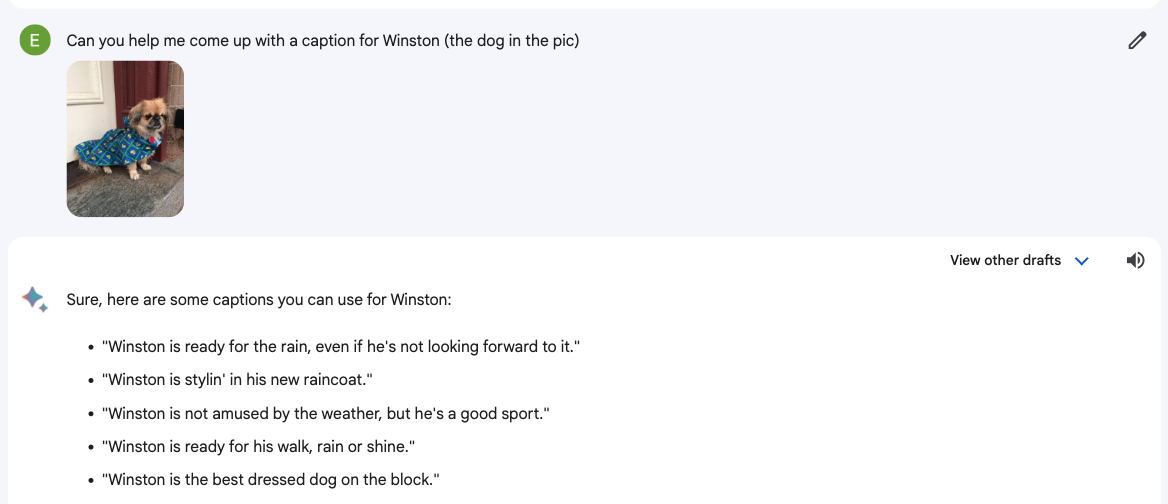
And here's one from ChatGPT for the same image.
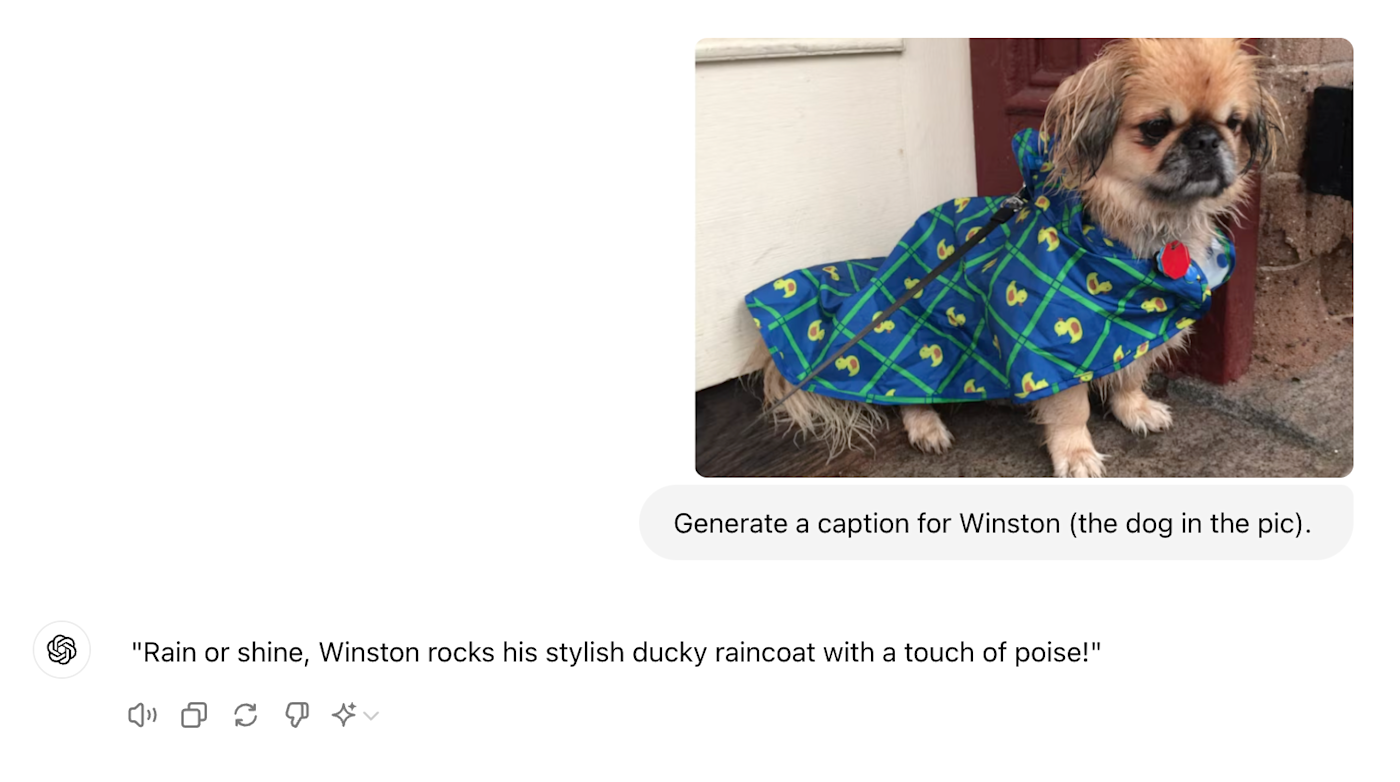
Both apps can process data-related tasks, but ChatGPT does more for free
Rather than copying and pasting information into a ChatGPT window and feeding it prompts, you can upload files from your computer or directly from Google Drive or Microsoft OneDrive and ask ChatGPT (using GPT-4o) or the Data Analyst GPT (paid users only) to analyze and interpret things like code, spreadsheets, and all types of documentation.
It goes beyond just interpreting data, though. The Data Analyst can convert files from one format to another. For example, you can turn an article into a presentation (and vice versa) with a simple prompt.

And it can turn your data into graphs and different visualizations of that data. Here's a pie chart it generated based on a .csv export of survey data.
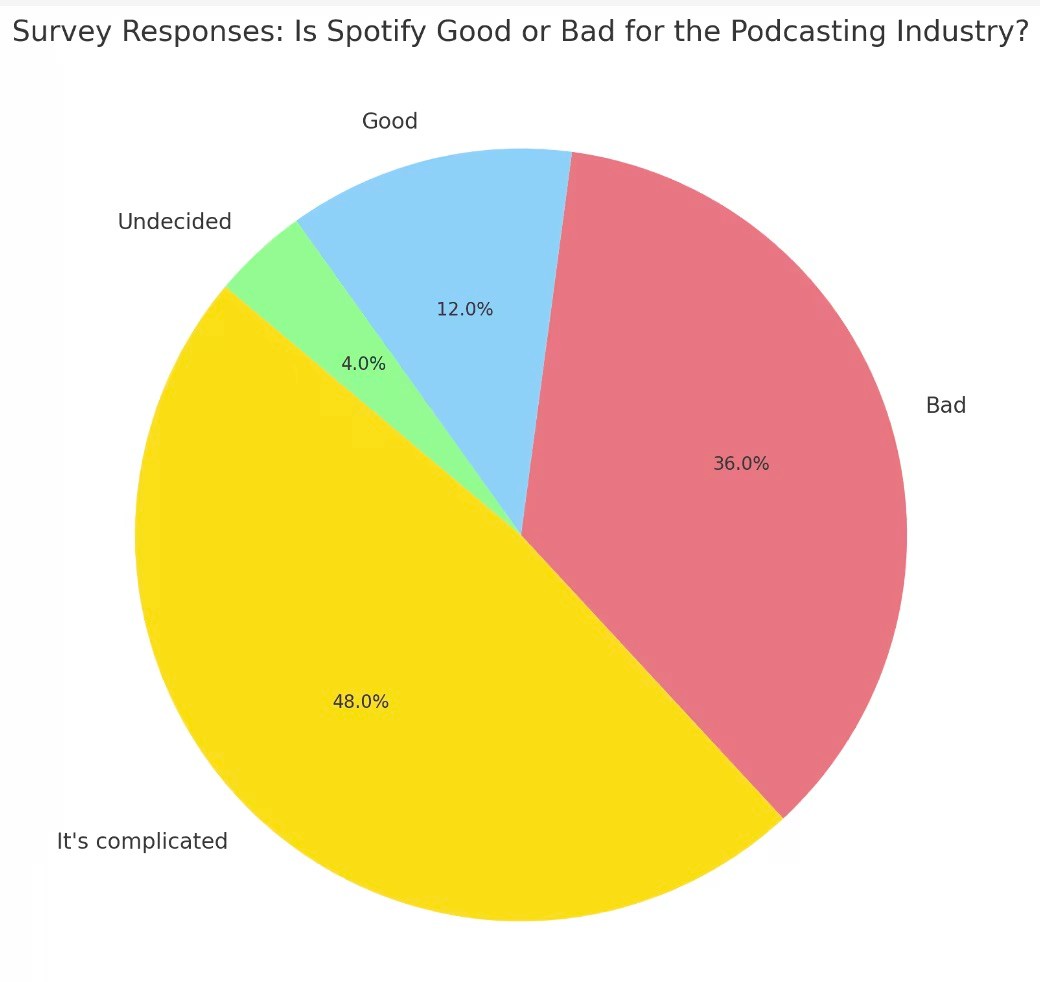
Users with a Gemini Advanced plan can also upload documents directly to Gemini, but you're limited to only asking for summaries, feedback, or insights about the file. This is a new feature for Gemini, though, so I wouldn't be surprised if it offered the same level of functionality as ChatGPT in the near future.
Gemini offers more flexibility in sharing conversations
ChatGPT and Gemini make it easy to share conversations, but here's where ChatGPT and Gemini differ.
Gemini lets others pick the conversation up from where you left off
If you share a Gemini conversation, anyone with access to the chat can pick up where you left off.
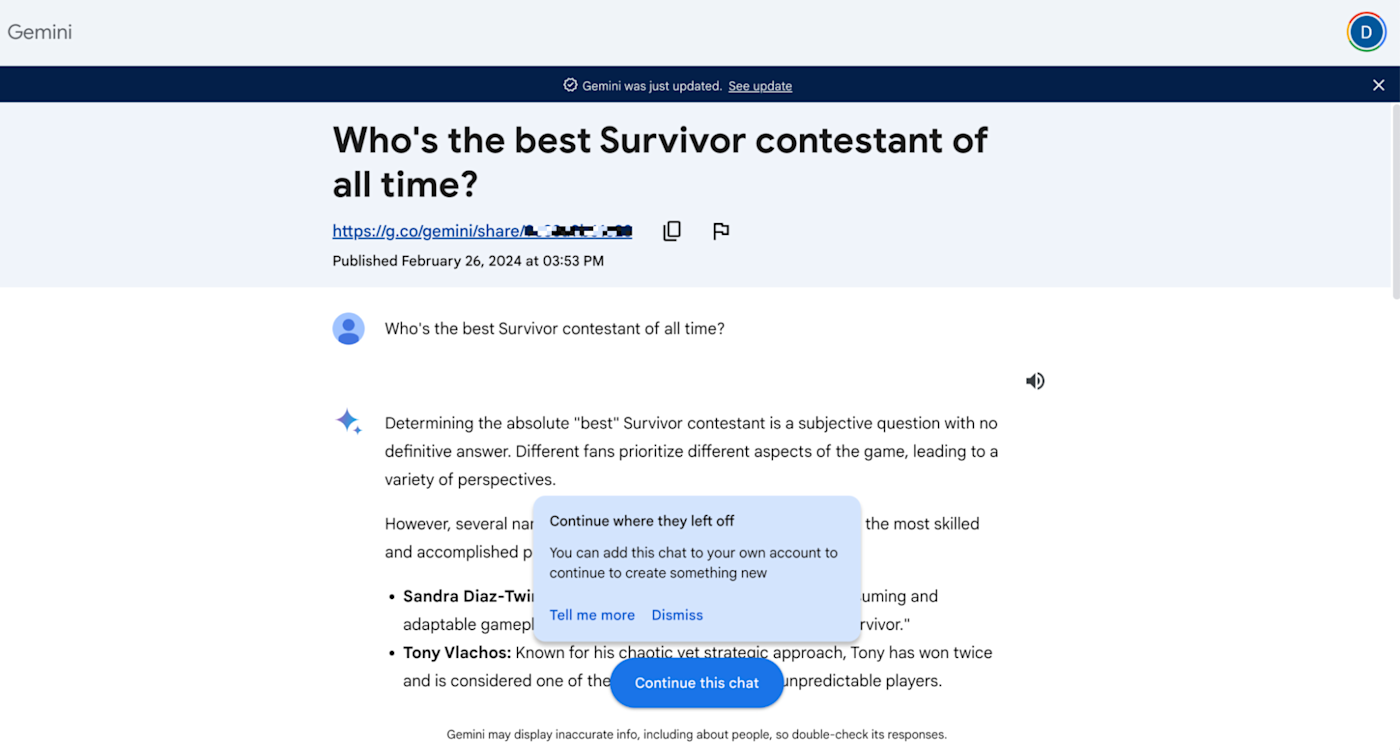
ChatGPT used to let users continue a conversation from a shared link, but for some reason (which I have yet to find), they've discontinued that. Instead, only Enterprise users can share chat templates. It's not the exact same as letting teammates continue a conversation from where you left off, but it does give them a way to kickstart the chat.
ChatGPT doesn't let you share conversations with images
If you upload an image to a chat with Gemini and then share the entire chat, the image will be visible to and downloadable by anyone who has access to that conversation.
If your conversation with ChatGPT includes images—whether you uploaded it or asked ChatGPT to generate it—you'll have to keep it to yourself. Or you can copy or screenshot the response. Sharing conversations with images is not yet supported.
Gemini lets you export responses to Google Docs and Gmail
Since Gemini is a Google product, it's no surprise that it's connected to your Google Workspace—specifically, Google Docs and Gmail.
Let's say you used Gemini to create an article outline. Now you can export that response to Google Docs and begin drafting—no copying and pasting required (unlike ChatGPT). You can do the same thing with Gmail, too.
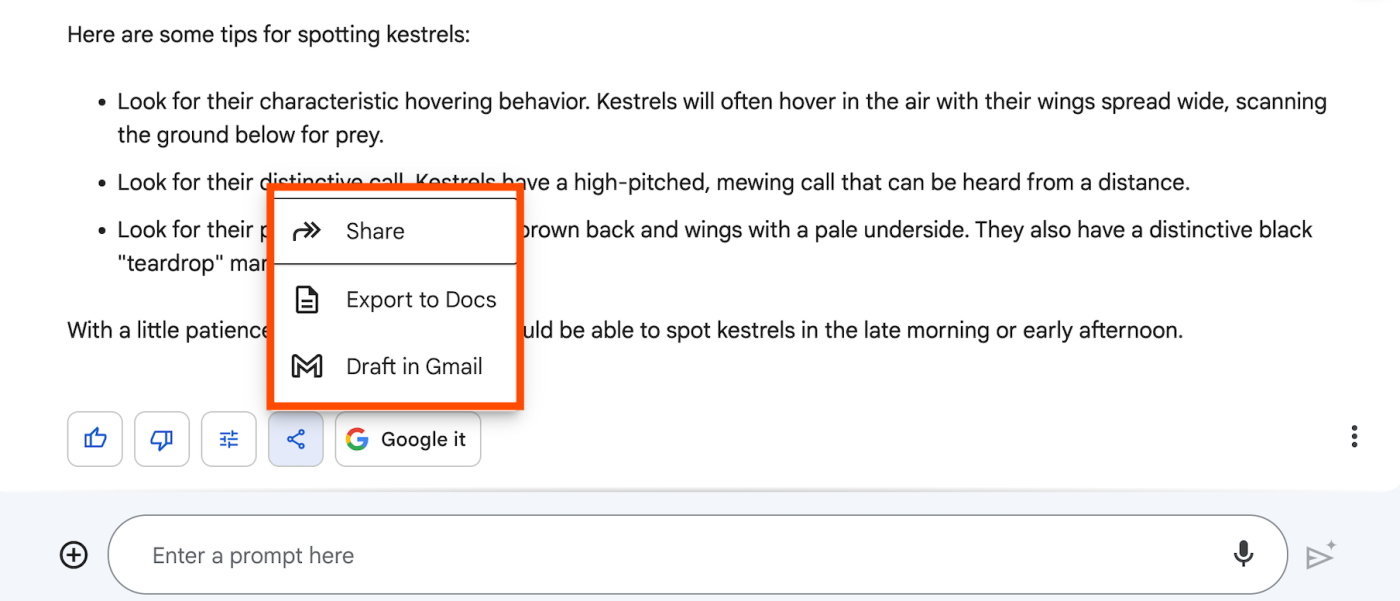
Both apps have powerful integrations
Gemini and ChatGPT can both connect directly to other apps, but they go about it a bit differently.
Gemini uses Gemini Extensions, which retrieves real-time information from other Google apps, including Gmail, Google Drive, Hotels, Flights, Maps, and YouTube. This means you can do things like ask Gemini to find cheap flights for your next trip or pull details from an email confirmation in Gmail—all without leaving the chat.
Here's an example of Gemini retrieving flight options for an upcoming trip.
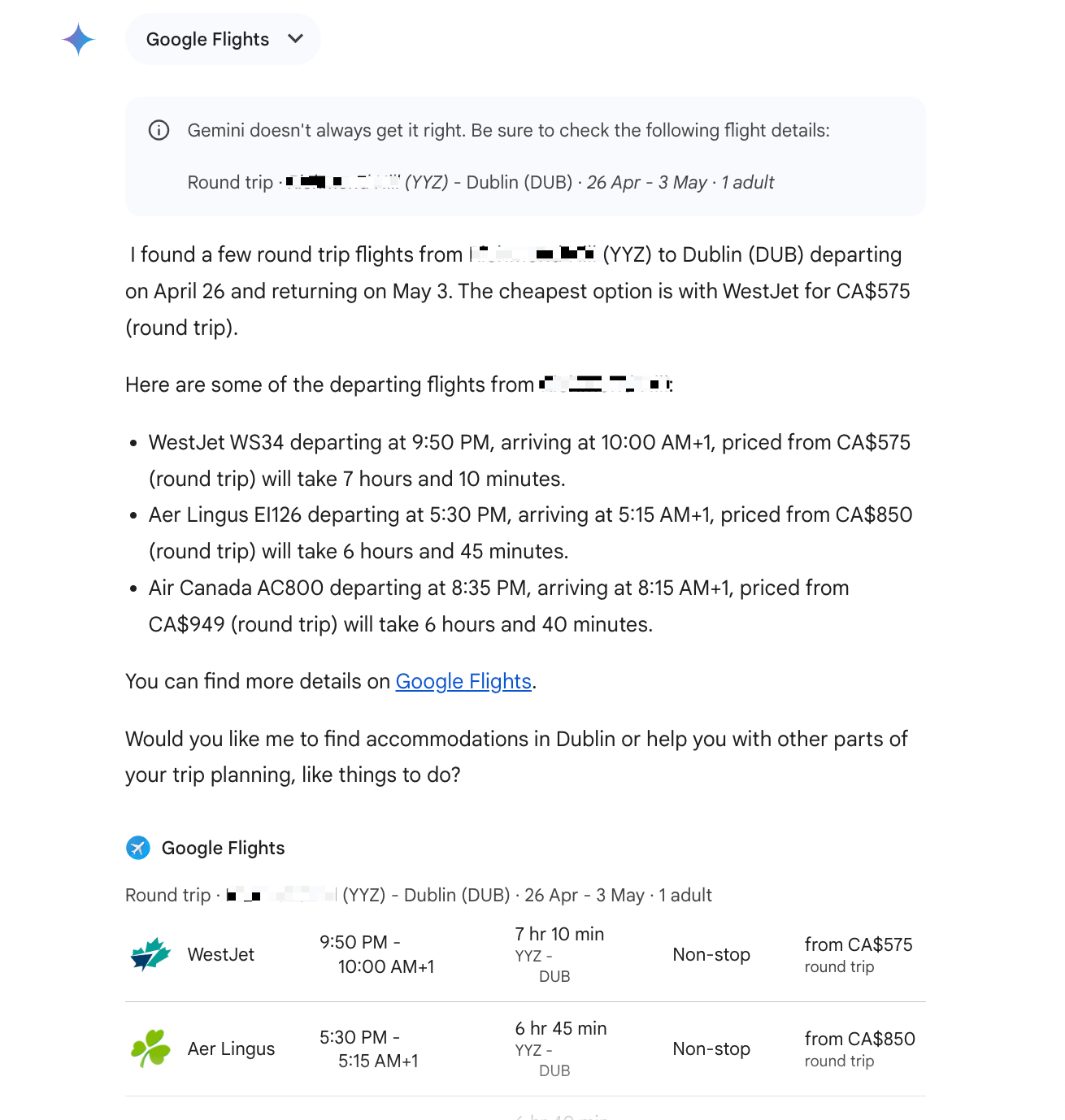
With Zapier's Google Vertex AI and Google AI Studio integrations, you can also access the model behind Gemini from all the apps you use at work. It's a little less applicable to the everyday user, but it works. Here are a few examples to get you started.
Activate prompts in Google AI Studio when new button clicks are detected in Zapier Chatbots
Send prompts in Google AI Studio (Gemini) when new messages are sent to a page in Facebook Messenger
Send prompts in Google Vertex AI every day using Schedule by Zapier
Classify texts in Google Vertex AI when new or updated rows occur in Google Sheets
To get started with a Zap template—what we call our pre-made workflows—just click on the button. It only takes a few minutes to set up. You can read more about setting up Zaps here.
Zapier's ChatGPT integration also lets you connect to other apps. This means that you can use it to send data across thousands of other apps and incorporate AI into your other workflows. Learn more about how to automate ChatGPT, or get started with one of these pre-made workflows.
Start a conversation with ChatGPT when a prompt is posted in a particular Slack channel
Create email copy with ChatGPT from new Gmail emails and save as drafts in Gmail
ChatGPT lets you build your own custom versions of it
If you're a Plus or Enterprise user, OpenAI allows you to build custom ChatGPTs (called GPTs). And there are no limits to how many GPTs you can build. All you have to do is tell the GPT builder, in plain English, what you want to create, and the builder will take it from there.
Here's what the GPT builder suggested when I asked it to create a chatbot that shares only fun facts about otters.
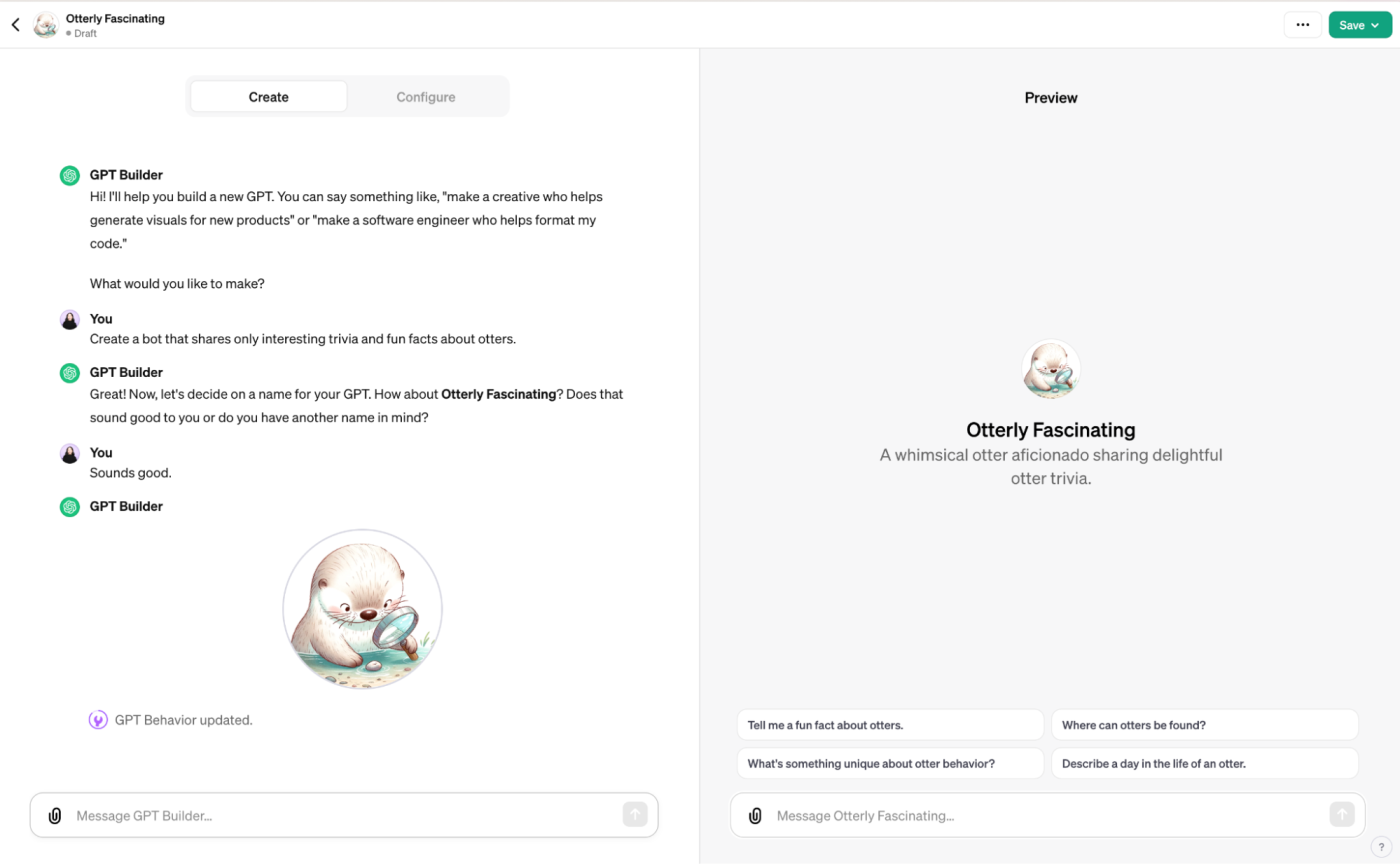
You can also pull in GPTs into your ChatGPT conversation by entering @[GPT name] followed by your prompt in the message bar. This way, it's easy to toggle between chatbots and get the right kind of AI-powered support for the occasion.
Both apps offer flexible ways to manage your data
When it comes to data management, both apps offer similar controls.
Google lets you set your Gemini Apps activity so that it never saves your conversations, or it deletes them at a set cadence (Last hour, Last day, Always, or Custom range). If you turn your conversation history off in Gemini, your conversation history won't appear in the side panel (there's no way to retrieve them later on), and future conversations won't be used to train Google's models.
It's worth noting that even after you delete your conversations (or any Gemini Apps activity), Google retains that data for up to three years.
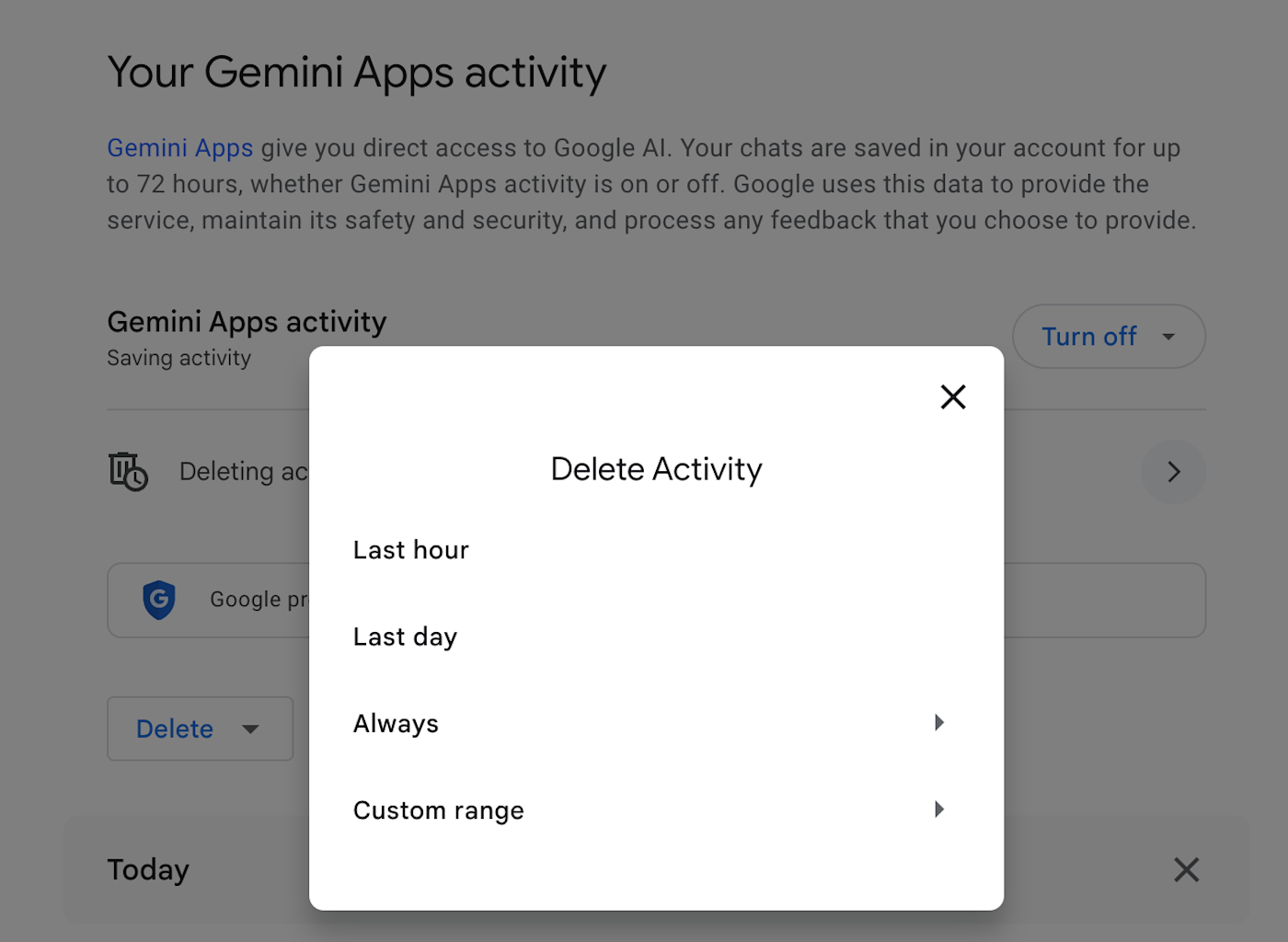
ChatGPT, for its part, offers temporary chats—where ChatGPT or GPTs don't use or create memories (details and preferences ChatGPT picks up on from past conversations) to inform responses. If you never want ChatGPT to pick up on your preferences, you can also turn off its memory.
Similar to Gemini, ChatGPT retains all deleted and temporary conversations—but for only 30 days. And that data is reviewed only when needed to monitor for abuse before permanently deleting.
The only other difference between Gemini and ChatGPT when it comes to data management is that you can archive ChatGPT conversations—you can't with Gemini. And you can always view, restore, or permanently delete these archived chats later on.
Gemini vs. ChatGPT: Which is better?
That was a lot to digest, so let's do a quick rundown of each AI chatbot's pros and cons.
Gemini: pros and cons
Pros | Cons |
|---|---|
Gemini is a better research tool, providing a list of relevant resources and the ability to fact-check its responses | Gemini can read its responses out loud, but it can't carry a back-and-forth dialogue |
Gemini lets you export responses to Google Docs and Gmail, and share text- and image-based conversations | Gemini provides a fairly isolated experience, with no plugins or integrations other than with Google apps |
Gemini can retrieve images from the web and generate AI images, offering these features for free to all users |
ChatGPT: pros and cons
Pros | Cons |
|---|---|
ChatGPT's data analysis features can process more advanced data-related tasks | Image generation is available only to ChatGPT Plus and Enterprise users (not free) |
ChatGPT lets you build custom versions of it | ChatGPT doesn't let you share conversations with images and others can't pick up where you left off |
ChatGPT's image generator is one of the best on the market |
It's worth emphasizing that ChatGPT and Gemini share a notable con: both chatbots are prone to generating plausible-sounding but inaccurate responses. At the end of the day, the better AI tool depends on what you're using it for—and whether you can deal with those pesky hallucinations.
Related reading:
This article was originally published in March 2023 by Elena Alston. The most recent update was in June 2024.
